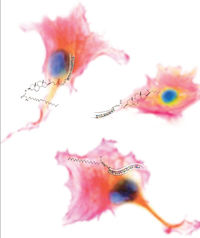Athersys Issued Patent for Secreted Protein Activation, Production
Cleveland, April 23, 2002 - Athersys Inc. announced today that it has received a U.S. patent covering key aspects of its core RAGE (Random Activation of Gene Expression) technology, specifically addressing the activation and production of secreted proteins and cell surface proteins. Use of the patented technology has enabled Athersys to create a genome-wide collection of secreted proteins, which it is applying in multiple internal research programs in areas including oncology, cardiovascular disease, immunology, neurobiology and developmental biology.
U.S. Patent number 6,361,972, entitled “Compositions and methods for non-targeted activation of endogenous genes,” is part of Athersys’ growing patent estate surrounding its proprietary RAGE technology. Currently, the Company has an additional 17 patents pending related to the core RAGE technology platform, with multiple issuances expected over the next six months. Athersys’ RAGE technology enables production of virtually every protein in the human genome without first having to clone and isolate genes, or even know a gene’s sequence or elements that control its expression. Athersys has formed a number of collaborations around its RAGE technology with partners including Bristol Myers Squibb, Pfizer, Medarex, and 3- Dimensional Pharmaceuticals.
Commenting on the significance of the recently issued ‘972 patent, Gil Van Bokkelen, Ph.D., chairman, president and chief executive officer of Athersys said, “Historically, secreted proteins and cell surface proteins have been a rich source of new therapeutics and drug targets, and are currently the focus of major drug discovery programs throughout the industry. Our comprehensive library of secreted proteins is enabling us to efficiently conduct a broad range of research programs, including those designed to identify factors that regulate many important aspects of cellular function, growth and development. Combined with our other capabilities, we can efficiently identify and validate novel antibody targets, small molecule drug targets, and therapeutic protein candidates. We can also produce cell lines expressing clinically validated drug targets in a manner that does not require the use of cloned and isolated gene sequences.”
Most read news
Other news from the department research and development

Get the life science industry in your inbox
By submitting this form you agree that LUMITOS AG will send you the newsletter(s) selected above by email. Your data will not be passed on to third parties. Your data will be stored and processed in accordance with our data protection regulations. LUMITOS may contact you by email for the purpose of advertising or market and opinion surveys. You can revoke your consent at any time without giving reasons to LUMITOS AG, Ernst-Augustin-Str. 2, 12489 Berlin, Germany or by e-mail at revoke@lumitos.com with effect for the future. In addition, each email contains a link to unsubscribe from the corresponding newsletter.

























































